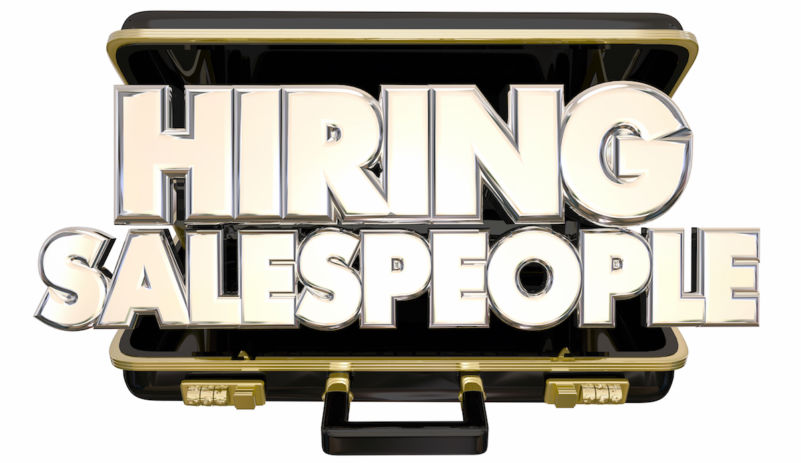You’re a successful CEO of a founder-led business. You’ve achieved product-market fit that’s showing great potential. And you’re clear on the core customers that will drive your growth. You need to hire the right salesperson to take you to the next level. The best salespeople are team players with a strong drive to succeed, proactive work approaches, and the ability to build personal relationships. Finding them isn’t an easy task.
Maybe you’ve already hired a sales organisation, but it’s underperforming badly. And you’re thinking, how would I do it differently if I did this again? What would my expectations be, and how would I measure success?
Whatever your situation, you’re not alone. Identifying the right salespeople for your scale-up is hard. Really hard. It’s a challenge I’ve faced many times in my career as Managing Director of three fast-growing technology companies. And now I’m coaching my clients through it. The same misconceptions crop up time after time.
Recognise that founder-led sales is a bottleneck
If you’re a sole founder, you’ve likely been intimately involved in the sales process up to now. Or one of your founder colleagues has taken up the sales slack. You may have got to 10 customers or so, but founder-led sales have become a bottleneck. Let’s face it. If you don’t enjoy it, there’s no incentive to slog away at increasing sales. A good salesperson with continuous learning, good listening skills, and problem-solving abilities is essential to overcome this challenge.
Sure, there’s a certain level of intellectual challenge at the start. It’s like learning to weight-lift. You can look at YouTube videos to start off with. At some point, you might need a coach to show you how to do it properly. After a while, you can start to up the weights. But there will come a point where you’re not learning anything new. You’re just lifting weights. And if you don’t like it, you’re not going to carry on doing it. It’s just not your thing.
Understanding and meeting the needs of potential customers is crucial for sustained sales success. You can force yourself for a while, but if you don’t get joy from selling, it’s not going to work long-term. If you’re CEO of a SaaS company, you’ll need to be able to demo your product. I recently discussed this with Steve Blank, founder of the Lean Startup movement, for my podcast. Executive selling will still be important. But you need someone who gets genuine joy from sales to do most of your legwork.
Find someone who can close new business

To scale-up a business, you need salespeople who can close. Sounds obvious, but you’re looking for a specific type of person here. In the tech world I’ve always inhabited, people tend to think, ‘OK, what type of salesperson do I hate? I’m not going to hire one of them.’ And they end up recruiting someone useless who can’t sell to save their lives. A great salesperson possesses charisma, persistence, and negotiation skills, essential for closing new business.
Only 15% of salespeople regularly hit their target. 15%! That’s not many. And you want one of these top 15% that can close business. Not someone who’s going to manage your existing customers. Don’t think, ‘We need an Account Manager who can do a bit of sales.’ That way lies disaster. Your new salesperson needs to be completely focused on how they get the next 10 customers on board. And then the next 50 after that.
Look for people who have closed new business for a) a company that looks like yours b) a product that looks like yours and c) a customer with similar problems.
A positive attitude is crucial for overall sales success.
Avoid anyone with ‘sales manager’ in their job title
Take a leaf from Justin Roff Marsh’s excellent book, ‘The Machine’ (or listen to my podcast where I interview him about the sales process). Look for people who will spend 80% of their time engaged in selling conversations. If you’re setting up a sales organisation from scratch, you don’t need a Sales Manager. If anyone has ‘manager’ on their CV, bin it.
Similarly, you’re not looking for someone who can generate inbound leads. There are plenty of other ways of doing this – hiring marketing people or outsourcing to an agency. This is about taking a customer with a more than zero propensity to buy your product and persuading them, through the art of sales, to buy. If you’ve genuinely achieved product-market fit, you’re selling something that fits a need. It’s a painkiller, not a vitamin. You just need someone who’s good at persuading customers to buy.
Successful salespeople are characterised by their passion, persistence, and positive attitude. Effective sales reps are crucial in various aspects, including meeting sales quotas and having a structured sales process to find the right prospects for their pipeline.
There are people out there for whom you’re offering the perfect opportunity. They’re motivated by influence and status, not money. HBR found that only 20% of high-performing salespeople are motivated by financial rewards (more of that in next week’s blog). These people like working in start-ups where they can have more impact. And where there is less stifling bureaucracy.
Hire two sales reps from the start

My advice would be to hire two people from the start. This reduces risk and helps build a successful sales team by fostering collaboration, support, and clear communication. That’s assuming you’re in a hurry to grow! If this is the first time you’ve hired a salesperson, you’ll have no process for understanding what good looks like. I’d guess you’ve only got a 25% chance of getting it right. Recognise that you could waste 12 months here – 3 months to hire, 6 months to work out they’re rubbish and 3 more to find a replacement. So, hedge your bets.
With two people, your chances of success go up incrementally. One salesperson is likely to be better than the other. Even if they both underperform, you will likely hit your sales budget. They will learn from one another if there are two of them, and they’re likely to come with overlapping skills and knowledge. Adding a bit of healthy competition is never a bad thing – it’s good for motivation and productivity. And they won’t be the only person doing their job. There’s someone to bounce around ideas and get some consistency in the process.
Good salespeople are adaptable to change, resilient to challenges and rejections, and committed to their goals.
One thing’s for sure: Your two new hires must be comfortable working with ambiguity. You haven’t nailed everything down, and they’re likely to have to make it up as they go along. So, hiring someone who’s used to established procedures and playbooks probably won’t be able to hack it.
Recruit sales professionals for resourcefulness
We were recently working on a cheat sheet for a client on the distinguishing core competencies of salespeople. The guys at Topgrading have tracked a whole host of these, and the one that stood out for me was ‘Resourcefulness’. If you’re searching for just one characteristic, this would be the one to go for.
When I read the description, it reminded me that when I recruit, I look for lucky people. And this overlaps with resourcefulness. People who say they’re 8, 9 or 10 on a scale of luckiness are usually A-Players. They don’t blame other people for their failure. They own their success and get on with it themselves. These people won’t constantly be coming to you to ask for things. They work out how to make it happen. Your job isn’t to motivate them. There’s plenty of innate self-motivation and drive. Top salespeople are confident in their ability to close deals, possess empathy, and have strong problem-solving skills.
Identifying and hiring top sales representatives who can fill the gaps in a sales team is crucial. It’s important to define the business’s specific needs, consider experience gaps, and evaluate potential salespeople’s skills and traits to ensure they can effectively meet client needs and achieve sales quotas.
These are people who aren’t going to need proposals, presentations and swanky decks – they’ll succeed without any of them. They’re experts in the art of relationships and conversation.
Get candidates to sell to you at interview
Get your short-listed candidates to show you their skills as part of your hiring process. Ask them to take you through their sales process. If they look at you blankly, they’re not an A-Player. A successful salesperson will be prepared, have a positive attitude, and exude confidence while explaining how and why they do what they do.
Make sure you put their success into context. In the past, I’ve hired people into sales roles at Rackspace who had been ragingly successful at Dell. But they failed with us. At Dell, there was a well-established sales playbook. It said to do these things in this order and use this script. If you follow it correctly, then 9 times out of 10 you’ll be successful.
It’s a different story when there’s no process. Because yours is a new product in a new market with little brand awareness, the things salespeople have done before for bigger, more established companies won’t work. Your recruits will need to iterate again and again. And they can only do that if they have a conceptual understanding of what they’re doing.
Personalised communication and focusing on tangible results are crucial for results.
So, test their understanding. Get them to talk to you about their core customer and be awkward. Eventually, at Rackspace, we realised we needed people who could do solution selling. This is very different from transactional sales. We weren’t looking for order takers. In these companies, customers had already gone through 80% of the sales process digitally before talking to a salesperson. Instead, we sought people who would proactively ring people and persuade them to buy. Even if they had no intention of doing that when they woke up that morning.
Look for evidence of genuine sales success
There are give-away clues to salespeople’s success (or otherwise) on their CVs. In addition to avoiding anyone with ‘manager’ in their job title, screen out people who have been in positions for less than 3 years. Anyone who’s spent 18 months in a sales job and then left is likely to be rubbish. Look for performance metrics – for every job, you should see their target, attainment and notable wins. And they should be evidently proud of these achievements.
It’s likely that you’ll see previous experience of sales in start-ups or smaller businesses where they’ve had a direct impact. Sales reps should demonstrate adaptability, knowledge of the company, and a strategic approach to sales. And they should be self-possessed enough to know they love working in your environment because this is where they have the most fun. When businesses become more structured, this doesn’t play to their strengths.
Persistence and handling rejection are crucial for the most successful salespeople.
And finally, make sure they’re not mavericks who won’t fit in with your team. If you word the job ad correctly, you will find the right person. Someone who knows that they’re doing something in your company that no one else can do. And earning status, kudos and respect as a result.

